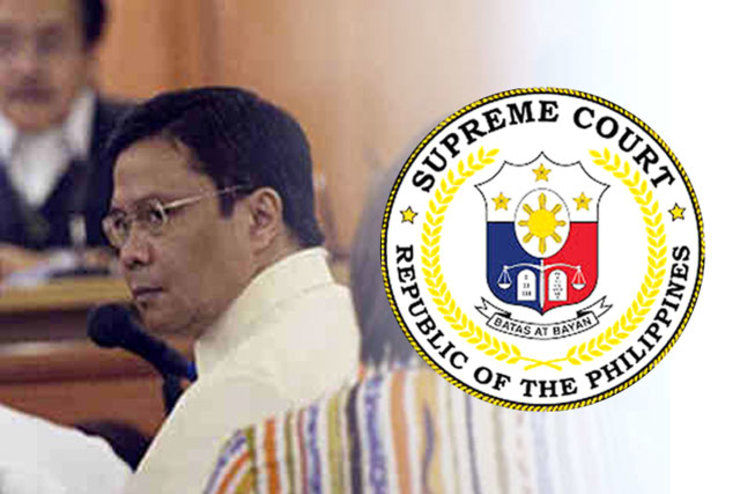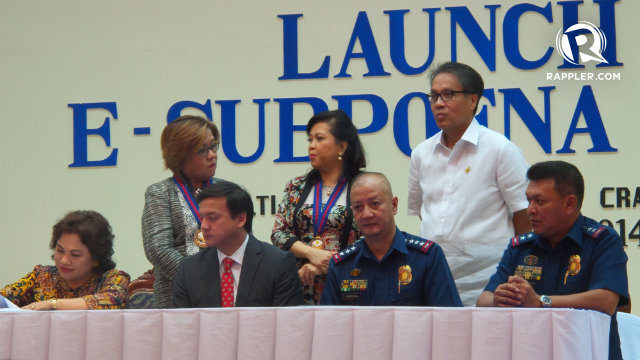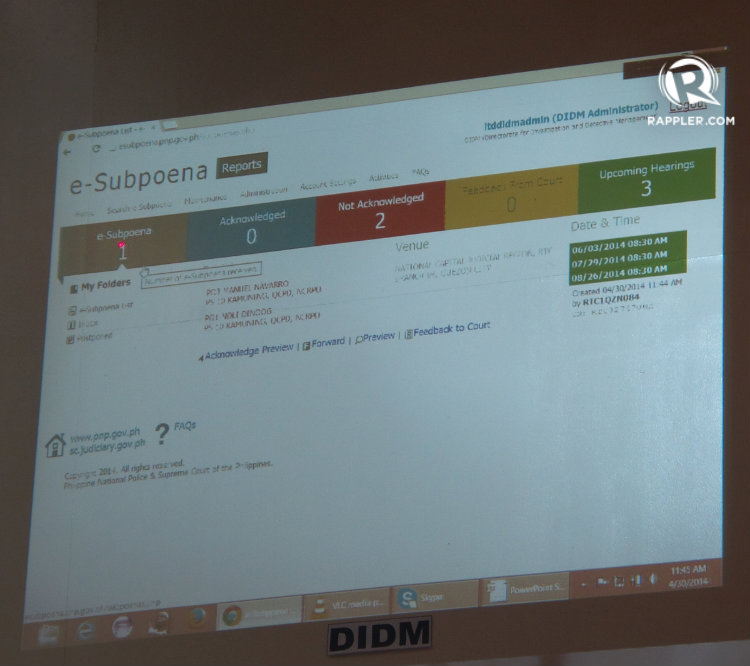
MANILA, Philippines – The possibility of Senator Jinggoy Estrada spending Christmas outside the Philippine National Police detention cell could rest on the vote of one Supreme Court justice.
After weeks of postponement, the 15-man High Tribunal on Tuesday, November 11, could vote on the violation of due process case filed by Estrada against the Ombudsman. This is in connection with the filing of plunder and graft charges against Estrada over the pork barrel scam. (READ: Jinggoy Estrada asks SC to stop pork barrel scam probe)
Initial information gathered by Rappler showed the voting could be a close call, with the justices still split down the middle as of last week.
In May 2014, Estrada filed a petition assailing the Ombudsman's March 2014 ruling that denied his request to be furnished copies of counter-affidavits of other respondents, new witnesses, and other filings. He argued that by denying his request the Ombudsman violated his constitutional right to due process.
The SC en banc vote will have far-reaching consequences for the other accused in the pork barrel controversy, particularly Senators Ramon Revilla Jr and Juan Ponce Enrile. Revilla and Enrile are also contesting before the SC the Ombudsman’s process of filing plunder and graft charges before the Sandiganbayan. (READ: SC en banc to take up Revilla plea to suspend PDAF probe)
The cases against the 3 senators and their co-accused stem from the Philippines' biggest corruption scandal in recent history, which exposed its alleged mastermind, Janet Lim Napoles, and prompted the SC to declare the lawmakers' Priority Development Assistance Fund (PDAF) as unconstitutional.
Estrada was jailed at the Camp Crame detention center on June 23, 2014, three days after his friend Senator Revilla was also brought to the same camp. Enrile, on the other hand, is under hospital arrest in the same camp.
Evenly divided
With the high stakes involved, Supreme Court insiders say there’s “intense lobbying” for a ruling that will be favorable to Estrada.
One of the justices, former Solicitor General Francis Jardeleza, has reportedly inhibited from the voting because of his previous post. The Office of the Solicitor General is representing the Office of the Ombudsman in the pork barrel-related cases filed against the graft agency before the SC.
In separate interviews, two sources privy to the deliberations said the justices’ sentiments are evenly divided at 7-7.
In case of such stalemate, Section 7, Rule 56 of the Rules of Court states that “where the court is equally divided in opinion, or the necessary majority cannot be had, the case shall again be deliberated on…” Simply put, a deadlock means the Court has not reached any decision.
However, if the deadlock persists after the second deliberation, court rules state that the petition is deemed dismissed without any jurisprudential value.
To secure an outright court victory, Estrada will need to secure 8 votes at the very least.
Due process
The senator has asked the SC to nullify the Ombudsman's preliminary investigation which became basis for the filing of the plunder and graft charges against him before the anti-graft court.
Estrada argued that his right to due process was violated when the Ombudsman failed to provide him copies of the affidavits of the other accused in the pork barrel case. He pointed out that the Ombudsman violated its own Rule of Procedure which states that the respondent “shall have access to the evidence on record.”
The Ombudsman also disregarded the Rules of Court which mandates that the complaint shall “be accompanied by the affidavits of the complainants and his witnesses, as well as other supporting documents to establish probable cause,” Estrada said.
Specifically, Estrada was referring to the affidavit of Ruby Tuason, which implicates Estrada in the pork barrel scam. Tuason, former appointments secretary of ex-president Joseph Estrada, said she delivered Estrada’s share of the loot in the lawmaker’s PDAF. Napoles, the alleged brains behind the scam, is also a friend of the Estradas.
Estrada also filed a separate petition before the SC, citing the equal protection clause under the Constitution. (READ: Jinggoy to SC: selective prosecution against the law)
The Ombudsman maintained that the rules do not require that the respondents be provided with the counter-affidavits of the other respondents. The anti-graft agency also countered that Estrada’s petition was rendered moot and academic when Estrada was eventually furnished copies of the counter-affidavits.
Court insiders say Justice Presbitero Velasco Jr, who was initially the ponente (writer) for the case, argued for the voiding of the information charge against Estrada. However, his position proved to be unpopular even for other justices who are inclined to side with Estrada.
One major problem behind Velasco’s position is its far-reaching implication on the conduct of preliminary investigations in court cases. “If his argument was followed, it would impact on all other criminal cases pending before the courts. This will wreak havoc in the judicial process,” one of the sources said.
Former Chief Justice Artemio Panganiban, in his column in the Philippine Daily Inquirer, concurred with the observation. A ruling following Velasco’s line “would cascade to many other pending criminal cases, because the conduct of the PI (preliminary investigation) would be modified radically,” he said.
Brion's middle ground
Velasco’s argument however could be Estrada’s express road to freedom.
One of the sources warned that the voiding of the information filed against Estrada would lead to his complete exoneration from the pork barrel anomaly. “If the Ombudman’s preliminary investigation is voided, you can no longer charge Estrada with plunder and graft charges since they’ve been arraigned already for such charges. The rule on double jeopardy will now apply to him,” the source familiar with the case said.
Double jeopardy refers to a constitutional right of the accused against being tried for the same offense from the same facts.
With the justices queasy about rocking the boat, Velasco’s position reportedly lost steam. However, a middle ground is said to have surfaced, courtesy of Justice Arturo Brion.
Instead of outright voiding the Ombudsman’s preliminary investigation, Brion is reportedly pushing to remand the case against Estrada back to the Ombudsman to conduct a reinvestigation. Since the preliminary investigation is not voided, the rule on double jeopardy does not apply. It will also mean Estrada stays in jail.
At best, it will only allow Estrada temporary freedom pending the Ombudsman’s reinvestigation. “The Ombudsman can just sustain its initial finding,” one of the sources explained. “However, this will embarrass the Ombudsman.” The current Ombudsman, Conchita Carpio-Morales, is a former member of the SC and an appointee of President Benigno Aquino III.
Swing vote
Based on initial feedback, Estrada has the solid backing of 7 justices who are all appointees of former president Gloria Macapagal Arroyo.
On the other hand, 4 appointees of President Aquino, including Chief Justice Maria Lourdes Sereno, and 2 other justices, are supposedly voting in favor of the Ombudsman.
For the tie, a 7th justice has reportedly committed to vote in favor of the Ombudsman “but could change at the last minute.”
The sources said there has been “intense lobbying” and the outcome of the voting will reflect that. – Rappler.com


